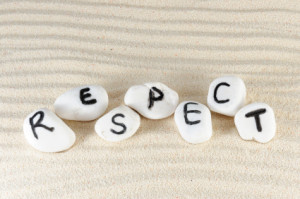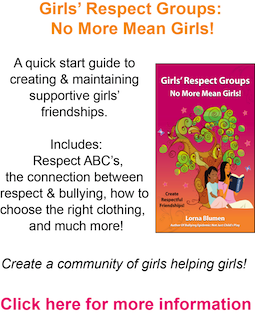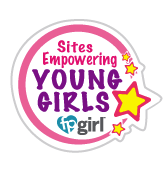What is respect? What does it look like in action? How can I strengthen and support my sense of self-respect, especially through the teen years, a time when self-respect is often at an all-time low? How do I get respect from others, especially if I’m feeling kind of shaky about my own sense of respect?
These are some of the questions that inspired us to create our Girls’ Respect Groups program. GRG has stimulated a lot of discussion and growth since it was created. GRG is now used in 30+ countries worldwide, so we’ve had many opportunities to learn from others, expand, revise, update, and layer the experiences of all our middle school girls, their teen GRG leaders, and the adults who anchor and support the program.
The Girls’ Respect Groups Program was inspired by our discovery of a wonderful book for preteen, teen, and young adult girls and women entitled Respect: A Girls’ Guide to Getting Respect & Dealing When Your Line Is Crossed, by Courtney Macavinta and Andrea Vander Pluym (Free Spirit Publishing, 2005). We loved Courtney and Andrea’s lively, straight-talking, “older sister’s advice” approach to developing the attitudes and practices of respect.
We loved their book so much that we wanted to put it in the hands of every girl we could find! With much conversation between Courtney and Lorna, Girls’ Respect Groups was created by Lorna and a team of real teens in Toronto, using Respect as the main reading material for our program, surrounded by games, interviews, videos, and 6 weeks’ worth of materials and activities created by us or contributed by others.
With love and thanks to Courtney and Andrea, let’s review their “7 Respect Basics”, their foundational ideas from Chapter 1 of Respect, which we expanded and used (with permission, Free Spirit Publishing) in the GRG program and the book, Girls’ Respect Groups: An Innovative Program To Empower Young Women & Build Self-Esteem! (Camberley Press Ltd, 2009), which contains the complete GRG Middle School curriculum.
1. Have Self-Respect
- Self-Respect means respecting yourself as a human being, just the way you are, with all your strengths and weaknesses. Certainly, we all want to keep growing and improving – that’s a lifelong task!
- Respect starts on the inside. If you don’t treat yourself with respect, nobody else will.
- Self-respect means trusting yourself, listening to your feelings and inner voice, taking the time to figure out what you believe in, and making good choices for you.
- Self-respect also shows when you treat others with respect, even and especially when they make mistakes or show less than their best selves.
- Self-respect means having the strength to forgive ourselves when we make mistakes, without putting ourselves down.
- Self-respect is so important, we devoted a full blog post to it several months ago. To see our 12-point list of the key features of self respect, click here.
2. Listen To Your Gut
- What do we mean by “listening to our gut”? It’s those body and mind signals, that deep down sense, our inner wisdom, or sometimes it’s our conscience, that sends us what feel like “instinctive” knowledge or feelings. These are important messages, that can send us warnings when we’re about to step into a dangerous situation or do something that we shouldn’t.
- We often ignore our gut feelings. Why and when do we push those valuable feelings away?
- When we’re embarrassed or afraid to look bad
- To please others or not to let others down
- When it’s easier to do what’s popular or accepted
- Problem is, if you keep silencing your gut feeling, eventually you’ll lose touch with it.
3. Set Your Boundaries
- What’s a boundary? A line you set that you don’t want others to cross. Sometimes we’re not even aware we have a boundary until someone crosses it. Ever had someone stand uncomfortably close to you, speaking right in your face? They’ve crossed your physical boundary (maybe your verbal boundary too, if they’re speaking rudely or angrily).
- You can (and should) have boundaries for how someone speaks to you, treats you, or touches you.
- Everyone’s boundaries are a little different and are related to your personal limits, values, and life experiences.
- We need to become aware of our own boundaries and sensitive to the boundaries of others, so we don’t inadvertently cross them. We need to be clear (and kind) about letting people know when they’re close to crossing one of our boundaries.
- How do you know when your boundary has been crossed? It’s that uncomfortable feeling, which gets worse the longer the boundary-crossing behavior continues.
- How do I know when I’ve crossed someone else’s boundary, unless they tell me? Think about how you feel when your boundary gets crossed, then think about the body language you might show (frown, widening eyes, backing up, arms crossed). If you’re in doubt, learn to stop and ask.
4. Speak Up
- We all deserve to be heard. Feeling strong enough to feel deserving of self-expression is one way that shows your self-respect is healthy.
- Many times we don’t speak up when we really should. Why not?
- We’re afraid of being judged
- We’re afraid we don’t have anything worthwhile to say
- We feel shy when we don’t know the others in the group
- We don’t know our clear feelings and are not sure what to say
- It takes courage to be honest about our feelings, opinions, and boundaries, especially when you disagree with your friends, family, or other (more powerful) adults.
- Speaking your mind is easier for some people, based on personality or when you’ve had lots of experience.
- It’s OK to disagree, but we should show respect for others when we do.
- Here’s something to practice: Learn how to speak without crushing someone else.
- There are big benefits to speaking up. When you’re clear about how you feel and where you stand, people learn how to treat you. This takes time.
5. Build Strong Relationships
- The way to get respect is to give it first, especially to other girls
- This may not be as easy as it sounds. You need to get to know people before judging them. It’s easy to blow someone off; it takes time to look inside.
- Respect people for who they are inside, not for their clothes, what they have, or how they look.
- If you look inside others, people will be willing to look inside you.
6. Fight For Equality
- Equality is important for everyone, not just for girls.
- All human beings of all backgrounds and ways of life deserve equal treatment, even and especially when there is conflict or disagreement.
- Show your strength and self-respect by standing up for your own rights and for the rights of others who have less strength and less power.
- Speak out against injustice – don’t be a bystander. Get involved. Speak up about Big Issues (world peace) & Small Issues (respecting boys & asking for respect from boys).
- Organize others to take a stand.
- The world is not perfect. There are many places and examples where equality is missing, but keep believing you are equal and working towards that goal, despite any discrimination.
7. Get Help
- Sometimes you know you’re not getting respect, but you don’t know how to stop it.
- It’s hard to admit you can’t do it alone and need help.
- It’s hard to stand up to adults (parents, teachers, employers, coaches) and get results without going too far (yelling, swearing, slamming doors, quitting).
- It takes time to open people’s eyes to your need for respect and your need for change.
- Try to find help from another adult who’s sympathetic or on your side.
- Find a friend to talk to.



